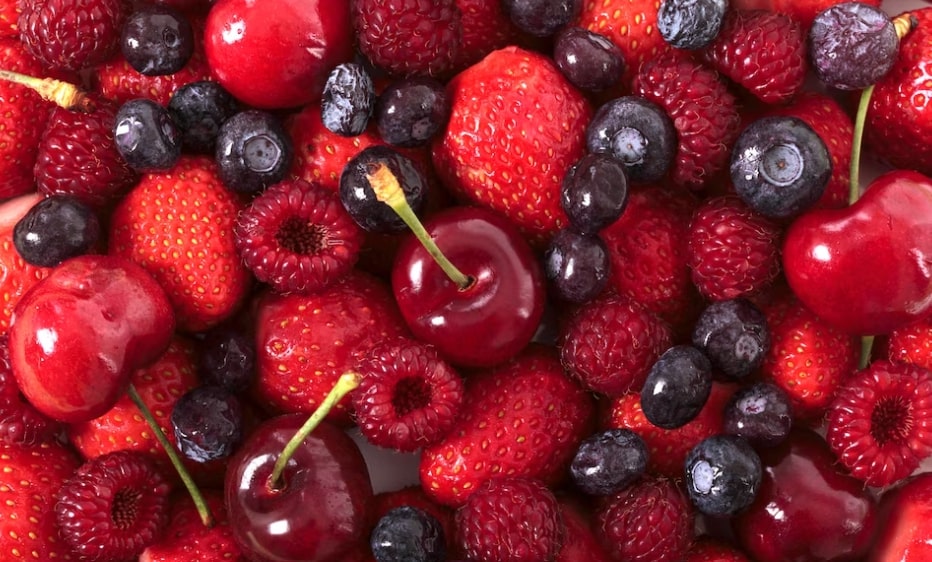A healthy heart is essential for long and active life, and a diet rich in fruits can play a big role in keeping your heart healthy. Fruits are a great source of essential nutrients like vitamins, minerals, and antioxidants, which can help to reduce the risk of heart disease and improve heart health.
In this article, we’ll take a closer look at the top 5 fruits for a healthy heart and why you should be eating them every day.
Berries

Berries are a great choice for a healthy heart, as they are high in antioxidants, fiber, and vitamins. Antioxidants help to protect the heart from damage caused by free radicals, while fiber helps to reduce cholesterol levels and improve heart health.
Berries are also low in calories, making them a great choice for people who are trying to maintain a healthy weight.
The Benefits of Berries for Heart Health
Berries are a delightful and colorful group of fruits that not only tantalize your taste buds but also provide a wealth of heart-healthy benefits. Packed with antioxidants, fiber, and essential nutrients, berries are a fantastic addition to your diet to promote cardiovascular wellness.
Antioxidant Power: Berries, such as blueberries, strawberries, raspberries, and blackberries, are rich in antioxidants like anthocyanins and quercetin. These antioxidants help combat oxidative stress and inflammation, both of which play a role in the development of heart disease.
Lowering Blood Pressure: The natural compounds found in berries have been associated with improved blood pressure regulation. Flavonoids in berries, particularly anthocyanins, can help relax blood vessel walls, leading to better blood flow and potentially lower blood pressure levels.
Cholesterol Management: The soluble fiber in berries, especially pectin, can help reduce LDL cholesterol levels by binding to cholesterol molecules and promoting their elimination from the body. By managing cholesterol, berries contribute to a healthier cardiovascular system.
Blood Sugar Control: Berries have a relatively low glycemic index, meaning they don’t cause rapid spikes in blood sugar levels. This is important for heart health, as maintaining stable blood sugar levels can help prevent insulin resistance and reduce the risk of type 2 diabetes, a significant cardiovascular risk factor.
Anti-Inflammatory Effects: Chronic inflammation is linked to various heart issues. Berries’ high content of antioxidants and anti-inflammatory compounds can help combat inflammation and protect the heart from damage caused by chronic inflammatory processes.
Apples

Apples are another great fruit for heart health, as they are high in fiber, vitamins, and antioxidants. The fiber in apples can help to reduce cholesterol levels and improve heart health, while the antioxidants in apples can help to protect the heart from damage caused by free radicals.
Apples are also low in calories, making them a great choice for people who are trying to maintain a healthy weight.
The Heart-Healthy Properties of Apples
Apples are not only a popular and versatile fruit but also boast an array of heart-healthy benefits that make them a fantastic addition to a balanced diet. Packed with essential nutrients and dietary fiber, apples contribute to cardiovascular wellness in several ways.
Dietary Fiber: Apples are a rich source of dietary fiber, particularly soluble fiber known as pectin. Soluble fiber has been linked to numerous heart benefits, including lowering LDL cholesterol levels. By binding to cholesterol in the digestive tract and promoting its excretion, soluble fiber helps reduce the risk of atherosclerosis and maintains healthy blood vessels.
Low in Calories and Fat: Apples are low in calories and virtually fat-free, making them a guilt-free snack choice. Consuming foods that are low in saturated and trans fats is important for heart health, as these fats can contribute to elevated cholesterol levels and increased cardiovascular risk.
Antioxidants: Apples contain antioxidants, such as flavonoids and polyphenols, which have been associated with heart protection. These antioxidants help neutralize harmful free radicals, which can damage cells and contribute to heart disease.
Vitamins and Minerals: Apples are a good source of vitamin C, an antioxidant that supports cardiovascular health by combating oxidative stress and maintaining the integrity of blood vessels. Additionally, the potassium content in apples helps regulate blood pressure, reducing the risk of hypertension and related complications.
Hydration: Apples have a high water content, aiding in hydration. Proper hydration is essential for optimal heart function, as it helps maintain adequate blood volume and circulation.
Oranges

Oranges are a great source of vitamin C, which is essential for a healthy heart. Vitamin C helps to reduce inflammation and oxidative stress, which can contribute to heart disease. Oranges are also a good source of fiber, which can help to improve heart health by reducing cholesterol levels.
The Heart-Healthy Properties of Oranges:
Oranges are widely recognized for their delicious taste and vibrant color, but they also offer a multitude of heart-healthy benefits that make them a valuable addition to any diet. Packed with essential nutrients and compounds, oranges contribute to cardiovascular wellness in several ways.
Rich in Vitamin C: Oranges are a stellar source of vitamin C, an antioxidant that plays a crucial role in protecting the heart from oxidative stress. This stress, caused by harmful free radicals, can damage blood vessels and contribute to heart disease. Vitamin C helps counteract this damage, supporting the health of the cardiovascular system.
Fiber Content: Oranges contain dietary fiber, particularly soluble fiber such as pectin. Soluble fiber helps lower cholesterol levels by binding to cholesterol molecules in the digestive tract, preventing their absorption into the bloodstream. By reducing cholesterol levels, oranges can aid in the prevention of atherosclerosis and maintain clear arteries.
Potassium: Oranges are a good source of potassium, an essential mineral that assists in maintaining healthy blood pressure levels. Potassium helps balance the effects of sodium in the body, promoting proper fluid balance and supporting relaxed blood vessel walls. This can contribute to lower blood pressure, reducing the risk of hypertension and related heart issues.
Flavonoids: Oranges contain various flavonoids, including hesperidin and naringenin. These compounds have been linked to improved heart health by reducing inflammation, improving blood vessel function, and enhancing overall circulation. Flavonoids may also help prevent the formation of blood clots.
Low in Saturated Fat and Sodium: Oranges are naturally low in saturated fat and sodium, making them a heart-healthy snack choice. Consuming foods with low levels of these harmful components can help maintain healthy cholesterol levels and reduce the risk of hypertension.
Hydration: Oranges have a high water content, contributing to hydration. Staying hydrated is important for cardiovascular health, as proper hydration supports optimal blood volume and circulation.
Bananas: Bananas are a great choice for a healthy heart, as they are high in potassium, which is essential for a healthy heart. Potassium helps to regulate blood pressure and reduce the risk of heart disease. Bananas are also a good source of fiber, which can help to improve heart health by reducing cholesterol levels.
Grapes

Grapes are a great fruit for heart health, as they are high in antioxidants, fiber, and vitamins. The antioxidants in grapes can help to protect the heart from damage caused by free radicals, while the fiber in grapes can help to reduce cholesterol levels and improve heart health. Grapes are also low in calories, making them a great choice for people who are trying to maintain a healthy weight.
The Heart-Healthy Benefits of Grapes
Grapes, both red and green varieties, are not only a delicious and convenient snack but also offer a range of heart-healthy benefits. Packed with antioxidants, vitamins, and natural compounds, grapes can contribute to the well-being of your cardiovascular system in several ways.
Antioxidant Richness: Grapes contain powerful antioxidants like resveratrol, quercetin, and flavonoids. These antioxidants help protect the heart by neutralizing harmful free radicals, reducing oxidative stress, and preventing cellular damage that can lead to heart disease.
Cardiovascular Protection: Resveratrol, a prominent compound in grapes (especially in red varieties), has gained attention for its potential cardiovascular benefits. It has been linked to improved blood vessel function, reduced inflammation, and lowered risk of blood clot formation.
Blood Pressure Regulation: Grapes are a good source of potassium, a mineral that plays a crucial role in maintaining healthy blood pressure levels. Potassium helps counteract the effects of sodium and supports proper fluid balance, promoting relaxed blood vessel walls and potentially reducing the risk of hypertension.
Cholesterol Management: The fiber content in grapes, including both soluble and insoluble fiber, can help manage cholesterol levels. Soluble fiber, in particular, can bind to cholesterol molecules in the digestive tract, aiding their elimination and contributing to healthier cholesterol profiles.
Improved Blood Flow: Some compounds found in grapes, like flavonoids, may promote better blood flow by enhancing the function of blood vessels. This can have a positive impact on overall circulation and reduce the risk of cardiovascular issues.
Reduced Inflammation: Chronic inflammation is a contributing factor to heart disease. Grapes’ antioxidant and anti-inflammatory compounds can help mitigate inflammation, protecting the heart from potential damage.
How to Incorporate These Fruits into Your Diet: Incorporating these fruits into your diet is easy and delicious! Try adding berries to your morning yogurt or oatmeal, snacking on an apple or banana, or drinking a glass of freshly squeezed orange juice. You can also add grapes to your salad or mix them with nuts for a healthy snack. The options are endless, so have fun and experiment with different ways to enjoy these heart-healthy fruits.
In conclusion, incorporating these top 5 fruits into your diet can have a significant impact on your heart health. From the antioxidants in berries to the fiber in apples and grapes, to the vitamin C in oranges, and the potassium in bananas, these fruits are packed with nutrients that can improve heart health and reduce the risk of heart disease.
Remember to make these fruits a regular part of your diet, and to talk to your doctor about any other lifestyle changes you can make to improve your heart health.
Medical References:
- Berry Fruits: Emerging Impact on Cardiovascular Health. (2020). Advances in Nutrition, 11(5), 1096-1106. https://www.ncbi.nlm.nih.gov/pmc/articles/PMC7394935/
- Apple intake is inversely associated with all-cause and cardiovascular disease mortality in a Danish cohort. (2019). The Journal of Nutrition, 149(10), 1768-1775. https://www.ncbi.nlm.nih.gov/pmc/articles/PMC6799137/
- Orange Juice and Vitamin C’s Effect on Heart Health. (2017). Current Developments in Nutrition, 1(10), e000964. https://www.ncbi.nlm.nih.gov/pmc/articles/PMC5826052/
- The Role of Potassium in Hypertension and Cardiovascular Disease. (2018). Current Hypertension Reports, 20(10), 72. https://www.ncbi.nlm.nih.gov/pmc/articles/PMC6232172/
- Grapes and Cardiovascular Health: An Update. (2019). Nutrients, 11(5), 1162. https://www.ncbi.nlm.nih.gov/pmc/articles/PMC6531271/









